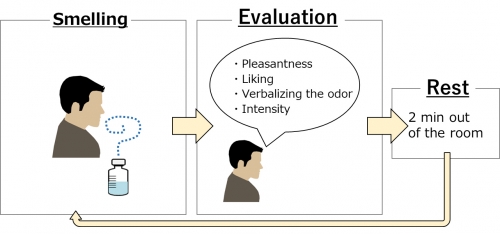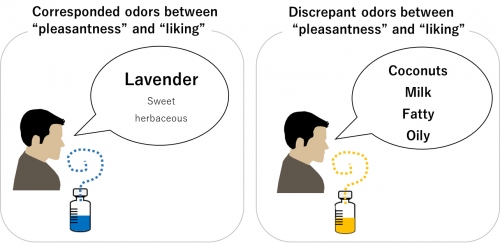研究成果 Research Results
- TOP
- News
- Research Results
- Analysis of an emotional gap induced by smell
Analysis of an emotional gap induced by smell
2018.08.21Research ResultsLife & Health
Emotion evoked by odors can be determined or modulated by several factors including odorant-receptor interactions and olfactory experiences. Because of these factors, some odors can induce an emotional discrepancy such as a conflict between innately determined and experience-based emotions. This study examined whether the difference between two subjective ratings, pleasantness and liking, for an odor can influence the olfactory perception to explore the emotional discrepancy effect on olfaction.
Dr. Tsuyoshi Okamoto, Associate Professor at the Faculty of Arts and Science, and Mr. Hamakawa Masayuki, a student at the Graduate School of Systems Life Sciences performed an olfactory psychophysical experiment where the pleasantness was defined as instinctive and innate emotion, and the liking was done as experience-based and acquired emotion. They found that the variety of olfactory linguistic expression (e.g. fruity and woody) were decreased according to the intensity in odorants showing the correspondence between the pleasantness and liking. On the other hand, odors showing the discrepancy between pleasantness and liking did not induce such decreasing of the olfactory linguistic variety. Their findings can help to understand the effect of particular types of emotion on olfactory perception and verbalization.
The study was supported by Kobayashi International Scholarship Foundation and Qdai-jump Research Program (grant number 27818, 2015–2017).
For more information about this research, see
Flavour and Fragrance Journal, Masayuki Hamakwa and Tsuyoshi Okamoto: “The effect of different emotional states on olfactory perception: a preliminary study”

Fig. 1. Experimental design of the olfactory psychophysics is shown. After smelling, participants were instructed to evaluate the 4 items about the odor; pleasantness, liking, verbalizing the odor, and intensity. Participants then took a rest, and subsequently tried next odors. They smelled and evaluated 36 odors.

Fig. 2. A model how emotional status affect olfactory perception. In odors showing the correspondence between the pleasantness and liking, the variety of olfactory verbalization was decreased according to intensity, while discrepant odors did not show such decreasing.
Journal Reference
The effect of different emotional states on olfactory perception: A preliminary study, ,Flavour and Fragrance Journal, 10.1002/ffj.3469Research-related inquiries
- TOP
- News
- Research Results
- Analysis of an emotional gap induced by smell































